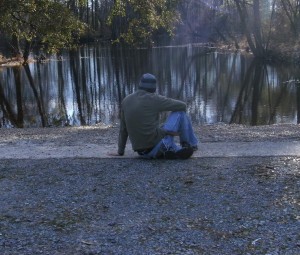No one likes a middleman. We constantly hear or see advertizements from merchants who “cut out the middleman” in order to save you money. Middlemen are also present within heavily bureaucratic systems (such as government) where one must cut through so much “red tape” that results seem impossible.
For Protestant Christians, the Catholic practice of confession (part of the sacrament of Penance of Reconciliation) is just another form of religious red tape.
 For many Protestants, this one verse settles the issue of confession:
For many Protestants, this one verse settles the issue of confession:
“For there is one God and one mediator between God and men, the man Christ Jesus…”–1 Timothy 2: 5
Seems like this verse ties things up quite nicely, but what is confession? As a former Protestant in high school, I had the same question…but it took me about 10 years to actually ask a Catholic.
According to the Catechism of the Church, the Sacrement of Penance is:
“The liturgical celebration of God’s forgiveness of the sins of the penitent, who is thus reconciled with God and the Church. The acts of the penitent–contrition, the confession of sins, and satisfaction or reparation–together with the prayer of absolution by the priest, constitute the essential elements of the Sacrament of Penance.” –definition from the Catechism, Second Edition.
Okay, but what does it look and feel like? And there’s the word “priest” again! Sneaky middleman…
During the homily (sermon) of yesterday’s Mass, our pastor invited the church congregation to a special penance service that afternoon. I was also invited. This was my chance to get my nose out of the Catechism and see what confession and penance was all about–to see if the Catholic Church really wanted to replace Christ.
“Humanity reaches its physical and spiritual heights in the company of others,” the pastor said during homily. “That is why we are designed as social creatures: to build one another up–to challenge and nurture one another in Christ.“
One another in Christ…that, is the Church.
Because I am not an official, baptized and confirmed Catholic, I could not experience confession with a priest. For those in the middle of learning about the faith before confirmation (this usually takes about a year), a church deacon (an ordained layman) acts in the role of the priest.
I walked into the youth group social room and approached Deacon Alex. He was decked in a white robe and a purple sash with a gold-threaded cross. We embraced and then he welcomed me to sit beside him. Without a word, Deacon Alex looked me in the eye and waited. In that moment, had he been an actual priest, he would represent Christ.
Then, I confessed my sin.
The confession of sin(s) isn’t a laundry list of bad things you’ve done. In the examination of conscience (a process of meditation before confession where you privately size-up your life by the 10 Commandments), one really brings to light their shortcomings and weaknesses. We are all sinners, according to the Faith, and even priests go into confession.
I went through the examination and kept returning to the Stations of the Cross, those 14 moments between the sentencing of Christ to his burial. My sin was fear of bearing my own cross, of going back to the River Temple and facing my destiny.

I won’t go into the details of my talk with Deacon Alex, but he certainly nailed what I needed to hear. He shared a personal story of fear and struggle within his own family where he had to accept what was instead of wishing for an alternate future. He also reminded me of Christ’s parable of the Prodigal Son. And then, he challenged me to revisit Jesus in the Garden of Gethsemane.
“Even Christ himself was nervous and afraid in the face of his destiny. But at that moment, when he could have turned away, he accepted his cup. God cannot turn from his own design, even the one where he had to die to bring us back to him.” Deacon Alex leaned forward and grinned at me. “Don’t be afraid of the cup, Andrew, because this is God’s plan for you and he wants you close to him and his love.“

That’s the moment the light turned on and I truly faced my fear. No matter how terrified I am, no matter what it might cost, I can go forward with confidence and bear my cross strengthened by Christ’s example.
And I might not have gotten to that place without Deacon Alex.
That is the point and purpose of the Sacrament of Penance and confession. Privately, I can deceive myself–even in matters of forgiveness. Of course God forgives us of out sins and of course Catholics are called to pray to God and ask for his forgiveness daily because Catholics believe that only God forgives sins. The purpose and role of the priest, however, is to act in the person of Christ because that is the authority Jesus himself bestowed upon his Church.
“And I [Jesus] tell you that you are Peter, and on this rock I will build my church, and the gates of Hades will not overcome it. I will give you the keys of the kingdom of heaven; whatever you bind on earth will be bound in heaven, and whatever you loose on earth will be loosed in heaven.” –Gospel of Matthew 16: 18-19
This is why in the Creed, the Church is referred to as “apostolic,” because it is built upon the foundation of the original Apostles who from that time on, ordained others to continue the line of leadership in the Church. Every Catholic priest, including the Pope, bears this spiritual lineage and authority given by Christ.
After Jesus was buried, his disciples went into hiding for fear of the Jews. While waiting in a locked room, Jesus appeared to them…
“On the evening of that first day of the week, when the disciples were together, with the doors locked for fear of the Jews, Jesus came and stood among them and said, “Peace be with you!“…After he said this, he showed them his hands and side. The disciples were overjoyed when they saw the Lord. Again Jesus said, “Peace be with you! As the Father has sent me, I am sending you.” And with that he breathed on them and said, “Receive the Holy Spirit. If you forgive anyone his sins, they are forgiven; if you do not forgive them, they are not forgiven.” –Gospel of John, 20: 19-23
The priest doesn’t forgive sins as himself, he forgives them in the name of Christ who sent him. In that place where the Sacrament of Penance takes place between you and the priest, Christ is present with you, the confessor. The priest hears you, gives practical advice along with Scriptural reference for further guidance, and then absolves you of your sins in the manner Christ himself instructed. The priest then is not a middleman, but an instrument, because when a priest is ordained, he lays down his very life in devotion to Christ and the flock he is commissioned to care for.
There is so much more to confession than what I can fit in here, but I hope this clears up some misconceptions regarding the sacrament. Often times when a Christian prays alone, she can cast God in her image and deceive herself about the nature of her sins. How much more difficult and purifying is it to speak to someone in the flesh? We can assume that we’re forgiven when we hurt someone, but change does not happen until we meet one another face to face.
What are your thoughts on confession and the Sacrament of Penance? Was there a time it served you well or not so well?

